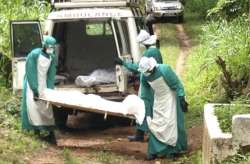UN: Ebola death toll rising to 4,500 this week
Geneva: The death toll from Ebola will rise this week to more than 4,500 people from the 9,000 infected and the outbreak is still out of control in three West African nations, a top official

Geneva: The death toll from Ebola will rise this week to more than 4,500 people from the 9,000 infected and the outbreak is still out of control in three West African nations, a top official with the U.N. health agency said on Thursday.
Dr. Isabelle Nuttall, director of the World Health Organization's global capacities, alert and response, said new numbers show the outbreak is still hitting health workers hard despite precautions—with 427 medical workers infected and 236 dead—mainly because Ebola victims are most contagious around the time they die.
Nuttall said the focus of the world's efforts should remain on the countries where the outbreak has been spreading out of control: Liberia, Sierra Leone and Guinea.
“Our data shows that cases are doubling every four weeks. The disease is still widespread in Guinea, Liberia and Sierra Leone, and there is persistent transmission of the virus,” she told a news conference in Geneva.
Although the effects of the crisis are increasingly being felt beyond its epicenter in West Africa, until now two nurses in Dallas and a Madrid nursing assistant are the only ones known to have contracted Ebola outside the hot zone.
Nuttall said Ebola cases were growing in Guinea's capital of Conakry but problems with data-gathering in Liberia, which has a significant under-reporting of Ebola cases in Monrovia, the capital, make it hard to draw any conclusions there.
It will take months before the outbreak is stopped, she said, adding that WHO has identified 14 African countries where being prepared and containing Ebola is a top priority.
Those countries are Benin, Cameroon, Central African Republic, Democratic Republic of the Congo, Gambia, Ghana, Guinea-Bissau, Ivory Coast, Mali, Mauritania, Nigeria, Senegal, South Sudan and Togo.
“They've been chosen because either they have land borders with the affected countries ... or they have high travel or trade routes,” Nuttall said.